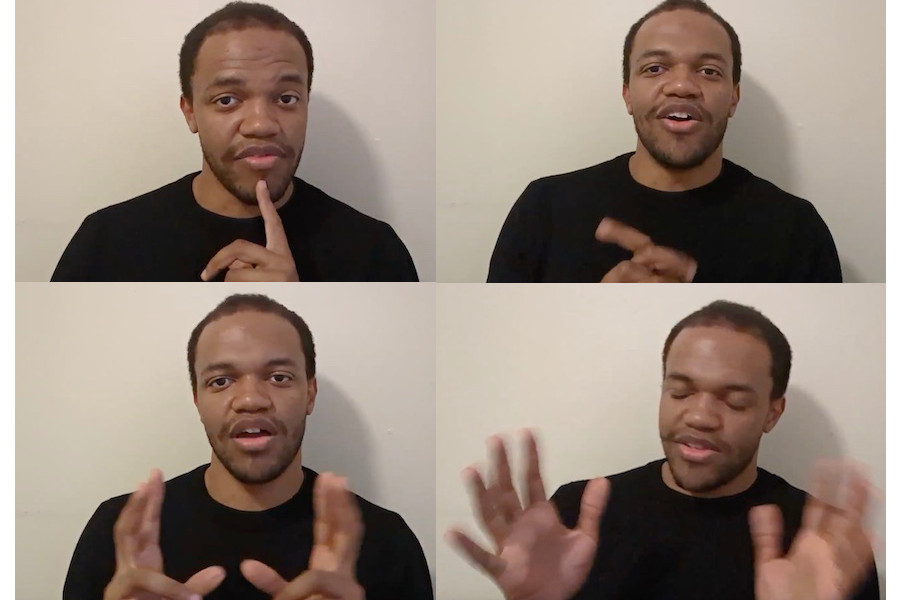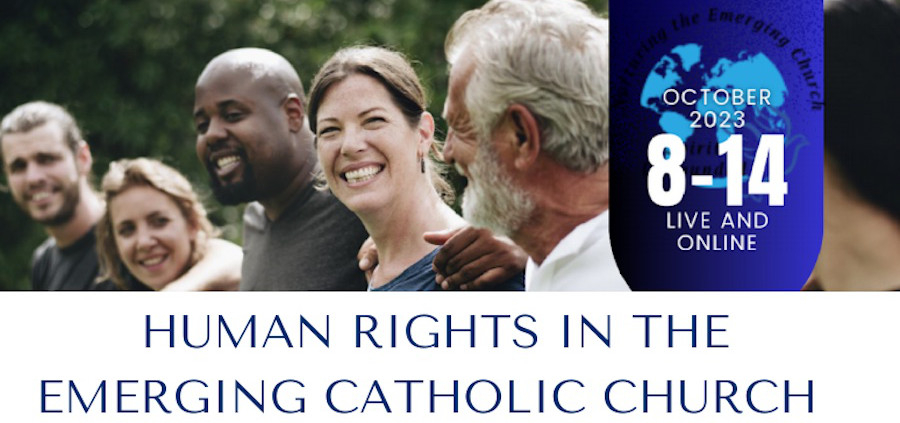“We Need to Talk about Human Rights”: An Interview with Nate Tinner-Williams
Earlier this week, Today’s American Catholic spoke with Nate Tinner-Williams, the co-founder and editor of Black Catholic Messenger and a featured presenter at “Human Rights in the Emerging Catholic Church,” a weeklong event coinciding with the 16th Ordinary General Assembly of the Synod of Bishops in Rome in October.
“Human Rights in the Emerging Catholic Church” is presented by Spirit Unbounded, a global community of Catholic reform and other Christian and ecumenical networks that share a vision of a just and inclusive church. The event will take place from October 8–14, 2023, and will feature both live and prerecorded digital presentations. Presentations from October 8–12 will be streamed online, with live and prerecorded presentations on October 13–14. Gathering spaces in Bristol (UK) and Rome (IT) will allow people to attend the event in person.
Unlike the Synod of Bishops which will be a closed-door gathering, Spirit Unbounded is describing this as “your lay-led Synod” to encourage Catholics around the world to join in online, hear their concerns discussed, and learn about positive solutions for a reformed church. This will offer participants from all over the world an opportunity to connect, share their hopes, and expand a network of reform-minded organizations that will endure beyond the official close of the Synod in 2024.
Keynote speakers Sr. Joan Chittister (USA), Dr. Mary McAleese (Ireland), and Steven Newcomb (Shawnee-Lenape author and scholar) head an expanding international roster with over 110 speakers. Presenters include activists, artists, and storytellers alongside academics and theologians. Spirit Unbounded is aiming to represent the diversity of the global church at the event, particularly Indigenous communities, and presenters from Oceania, Central and South America, Africa, the Middle East, and Asia. Tickets are available from $30, and will allow for unlimited access to presentations even after the official close of the event. Sarah MacDonald’s Tablet feature and Brian Devlin’s reflection in La Croix provide additional information.
We spoke about Nate’s connection with Spirit Unbounded, the themes of his presentation, and his hopes for the Synod and the church-reform movement. Our conversation has been lightly edited and condensed for clarity—Ed.
♦ ♦ ♦
How did you become involved with Spirit Unbounded and the “Human Rights in the Emerging Catholic Church” event?
It was recommended to me by a friend of the organization, Colleen Shaddox. She connected me with one of the people helping to lead the event and asked if I would like to speak. She had seen my work in the Black Catholic Messenger and she thought I would be a good fit. As I read about it, I thought, “This is an incredible movement that is developing.” So I dove in.
Your presentation speaks directly to the theme of the event, human rights. Can you comment on how human rights are perceived (or misperceived) here in the US, both in church and in civic spaces?
I think that most Americans think of human rights as a problem that’s raging elsewhere in the world, that it’s not something involving us relatively rich people in the Western world. Whereas, I think by the definition of what human rights are, that in fact it is an issue here in the United States, even in places where we do have privilege. There are classes of society, groups in American society that have been disregarded, and whose human rights are an open question in a lot of ways and a lot of scenarios.
What I covered in my talk was what [the idea of human rights] looks like here in this country, and how it interacts with the conservative elements in the Catholic Church who sometimes bleed into that group of people who will look at poor people or Black people and say, “Your human rights don’t matter.” They wouldn’t put it in those terms, and we might not think of it in those terms, but at the end of the day that’s what it is.
As you make clear in your presentation, the US is “a land of fading human rights and massively inhuman wrongs.” Why do you think there is such a gap between the way many people here understand themselves as Christians and the way they actually live their faith?
I think anywhere in the world, people’s concept of Christianity is shaped by the culture they live in. Especially if they’re raised as Christians, they’re brought up to think that Christianity means a certain thing, and often that thing is not this unfiltered version of Christianity, whether it be Catholic or otherwise. It’s often fused with the cultural mores of a country or even a subset of a country. A lot of people in America have been told that this conservative-evangelical tinge is part of what Christianity is, so people grow up, even as Catholics many times, thinking that certain political positions and positions on social issues are Christian or Catholic, when in fact they’re just conservative-evangelical positions, or whatever it may be.
As people become adults and become a part of the world that is making these decisions, they hold tightly to these things. Pope Francis preaches this unfiltered Christianity, what Jesus was talking about, and it hits a lot of Americans like a slap in the face: “That’s not what I was taught; therefore, you must be wrong.” It’s really tragic.
One line among many in your presentation that moved me deeply was this: “I must often turn away from my church just to get a glimpse of my own God: the suffering, brown, migrant Jesus Christ.” Can you elaborate on this “turning away,” and what kind of new possibilities, encounters, or insights into your own faith are discovered in such a turning?
I’ll speak to my experience as a Black Catholic, specifically as a convert. I joined the Catholic Church because I believe the teachings of the church are true. I pored over them to make this life decision that has really transformed my outlook on the world. So now, several years in, to see certain Catholic elements, Catholic leaders, Catholic bishops teaching or implying things that so obviously contradict the Catholic faith—that’s what I mean when I say I have to turn away from the church sometimes.
That filters down to the laity as well. Sometimes I feel surrounded by people in my own church who support things that I couldn’t possibly reconcile with what I converted to be as a Catholic, and in those moments I have to live my faith in exile. I don’t mean to be dramatic or put myself on some sort of pedestal, but it does feel that way sometimes, that I know I can’t be in certain Catholic spaces and know that there’s going to be this hunger for justice, that I’m going to hear Pope Francis’s teachings being championed. In a lot of Catholic spaces, I know that’s just not going to happen. In those moments I have to turn away to find Jesus, to find a true concern for the marginalized. Not just some of the marginalized, but all of them.
I’m not the only Catholic who feels this way. A lot of people feel like they’re living their faith in exile. It’s just a matter of holding out hope that there will be change and participating in these movements like Spirit Unbounded that will hopefully shine a light on injustice in a way that some other Catholic groups will not.
What concrete steps can the church take to restore these elements of Catholic social teaching and solidarity to the center of its doctrine? Or is it simply a matter of doing it ourselves, beginning where we are in our own local contexts?
I think the latter idea is the most compelling. And this is what Pope Francis has been telling us, that is has to be the laity that rise up and make these changes. We can’t always look to leaders. We can’t always look to a movement as a solution, because movements are not guaranteed and movements are temporary.
I know that a lot of times, some of us think it’s not even worth it to bother. Why would I want to serve in my church? Why would I want to remain in my church, given the craziness that we see all around us? But that’s what we have to resist, and we have to say, “If not me, who?” And so we stand up, even if we stand alone.

Stills from Nate Tinner-Williams’s presentation for “Human Rights in the Emerging Catholic Church”
The Synod will be conducted over a two-year period to give the church time to learn, listen, and discern the next steps forward. What are your hopes for this interim year between the first synodal assembly in October and the second in 2024?
To me the Synod sounds like a council. I know the Vatican’s been adamant in some ways that it’s not a council: it’s not Vatican III, and Vatican III isn’t coming any time soon. If that’s the case, then this is as close as we’re going to get in the near future. And I think when the church gets together and discusses global change within itself. That’s important, that’s monumental, that can be the fruit of our hope.
I’m glad that the upcoming sessions have been expanded massively beyond just the bishops, who obviously have a limited perspective. I think there’s a lot of potential for that to push us in the right direction. Of course, the Synod is about synodality, [so] I hope we learn to continue to listen.
Part of the US Catholic crisis is that some are not approaching the Synod at all. They’ve wanted to ignore it the whole time. Others had faux interest in it and will lambast people for not listening to these dissenting voices on either side of some issues. But I don’t think either extreme is helpful. The kind of listening that Pope Francis and the leaders of the church seem to be looking for is that which will help bring back in those who have been marginalized and felt pushed away from the church.
No solution is going to be perfect. Nothing can bring everybody back, because there is a difference in goals among the laity, and there’s a difference in belief among many Catholics. Not everyone’s going to be pleased with what comes out of the Synod, but it does sound like they’re interested in positive, progressive change on several issues. I think good things will come of it. I’m excited for what’s going to happen in October.
Finally, what are your hopes for Spirit Unbounded and “Human Rights in the Emerging Catholic Church”? Are there any speakers or presentations that you’re excited to see?
I’m an unapologetic homer for Black Catholics, so I’m excited about the Black Catholic speakers who will be a part of Spirit Unbounded. I believe Sr. Anita Baird is speaking. I know her voice is very powerful.
I know that in the Vatican’s Synod there’s going to be only a few African American representatives—not that we could expect so many. But whatever’s happening in addition with Spirit Unbounded to bring Black Catholic voices to the fore has to be part of the positive change in the church. That’s not the whole of it, but that’s where my mind is always at. ♦





Leave a Reply
Want to join the discussion?Feel free to contribute!